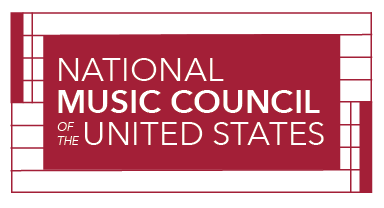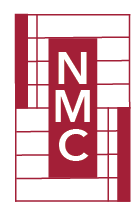Remember watching the little orange AOL man walk across your screen as you waited to log on to the Internet? Hearing “You’ve Got Mail” upon entering the World Wide Web was a cultural phenomenon that excited everyone lucky enough to be granted access – until you were booted off when someone answered the phone. What a new and fickle technology the 1998 Internet was!
Naturally, this fickle technology has evolved tremendously in the past 18 years. And as we all know, so have the many ways in which music is distributed online. Unfortunately, a digital piracy law enacted by Congress way back in 1998 is still on the books today, but with the opposite intended effect. This antiquated law – called the Digital Millennium Copyright Act (DMCA) – places an undue burden on creators by forcing them to police the entire Internet for instances of theft while unfairly favoring technology companies and rogue pirate sites. Perhaps searching for and taking down links to illegal uploads was possible back in 1998 when getting online required a landline and a prayer, but not so for today’s sophisticated Internet (the musicFIRST coalition, a broad-based coalition of artist and industry groups, has its clever take on the issue here).
Further, the DMCA has propagated an unfair licensing regime where some of the biggest ad-supported music services like YouTube pay artists and musicians peanuts, all while music consumption on those platforms has skyrocketed. The stark disparity between the meager music revenues from these services and the enormous amount of music consumption on them has been dubbed “the value gap.” In short, the DMCA has effectively helped enrich big tech companies who distribute music at the expense of artists and creators who have tirelessly worked to bring that music to life.
That’s why this past summer an unprecedented coalition of more than 500 artists – from superstars to independent artists spanning across all genres and generations – and 20 music organizations and companies signed an open letter to Congress decrying a broken DMCA. The open letter was published as advertisements in major Washington D.C. political publications, coming at a critical time as U.S. House Judiciary Committee Chairman Bob Goodlatte is reportedly planning to soon unveil reforms to U.S. copyright law. “As songwriters and artists who are a vital contributing force to the U.S. and to American exports around the world, we are writing to express our concern about the ability of the next generation of creators to earn a living,” reads the letter. “The DMCA simply doesn’t work…We ask you to enact sensible reform that balances the interests of creators with the interests of the companies who exploit music for their financial enrichment. It’s only then that consumers will truly benefit.”
As we all know, the music industry is relatively small compared to the weight of Silicon Valley who would prefer to keep the DMCA as is. But a unified music community lending its voice to ask for reforms sends a powerful message to policymakers. It’s important to stand together to strengthen the music economy and create a healthier, more stable ecosystem for the next generation of singers, songwriters, and musicians.
The National Music Council’s annual American Eagle Awards were presented at Summer NAMM in Nashville, TN for a second year in a row on Saturday, June 25. The highly prestigious Eagle Awards are presented each year in national celebration of an individual’s or an organization’s long term contribution to America’s musical culture and heritage. This year, music legends Emmylou Harris and Vince Gill were honored, along with the iconic Grand Ole Opry.
The awards featured performances by Emmylou Harris and Vince Gill, as well as special tributes to the honorees by Roy Clark, John Conlee, and Bill Cody. Proceeds from the event support the Council’s music education advocacy efforts. Click here for the photo high-lights of the event.
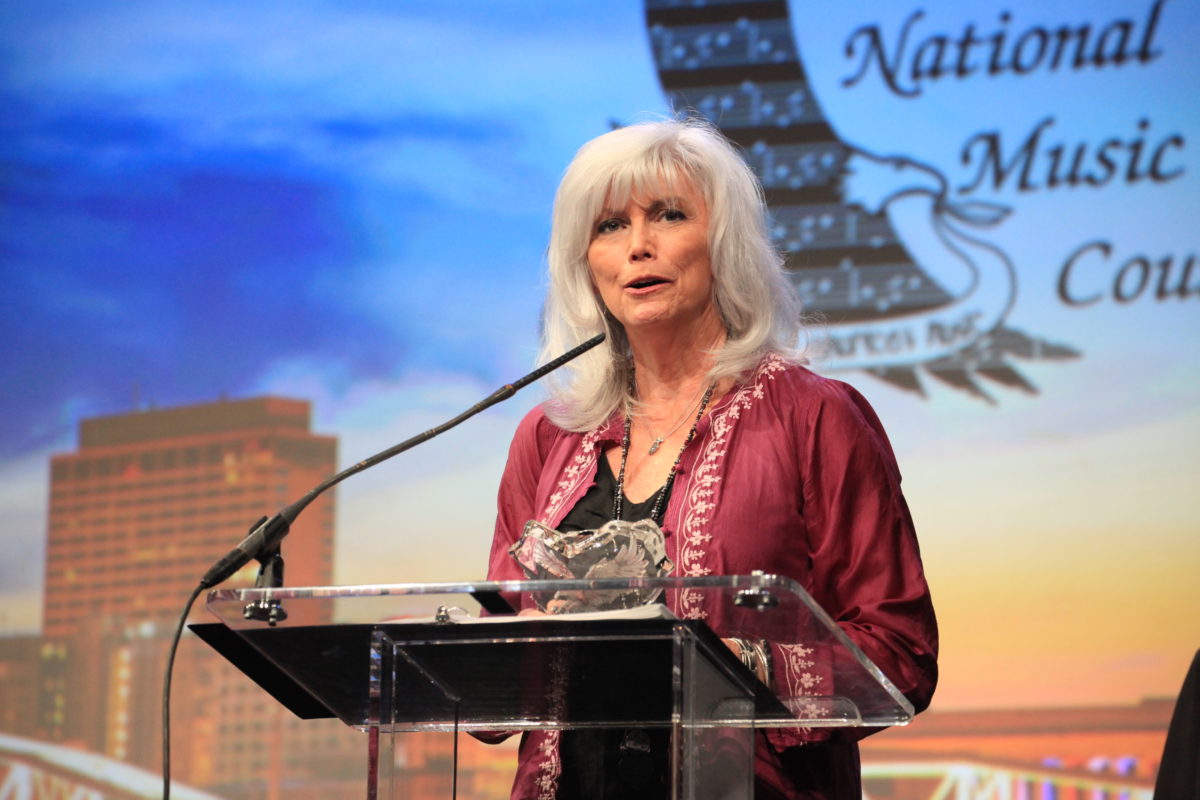
Emmylou Harris Accepts her 2016 American Eagle Award
Emmylou Harris is one of the most admired and respected female vocalists in music history. With 13 Grammy Awards and a trio of CMA trophies, her work has garnered admiration and praise from her peers. Beginning with her 1975 masterpiece Pieces Of The Sky, Harris began to carve out a reputation as one of the genre’s most progressive talents – though one with a clear reverence toward the history of the Country format. She made songs by The Louvin Brothers, Buck Owens, and Hank Snow hits again. She also teamed up with Dolly Parton and Linda Ronstadt for the iconic Trio album in 1987. Harris was inducted as a member of the Grand Ole Opry in 1992, and into the Country Music Hall of Fame in 2008.
Whether it be Country, Rock, Bluegrass, or Gospel, there is no genre of music that Vince Gill hasn’t excelled in during his much-heralded career. Starting out playing in a Bluegrass band called Mountain Smoke when he was a teenager, he later joined Boone Creek – a band fronted by future Country star Ricky Skaggs. He spent three years as lead singer of the Pop / Rock group Pure Prairie League before moving to Nashville in the early 1980s. It took him a few years to find his artistic path, but he hit big in 1990 with “When I Call Your Name.” Future hits included “Liza Jane” and “Go Rest High On That Mountain.” Twenty Grammy Awards later, Gill stands as one of the most revered male artists of all time. He was inducted into the Grand Ole Opry in 1991, and the Country Music Hall of Fame in 2007.
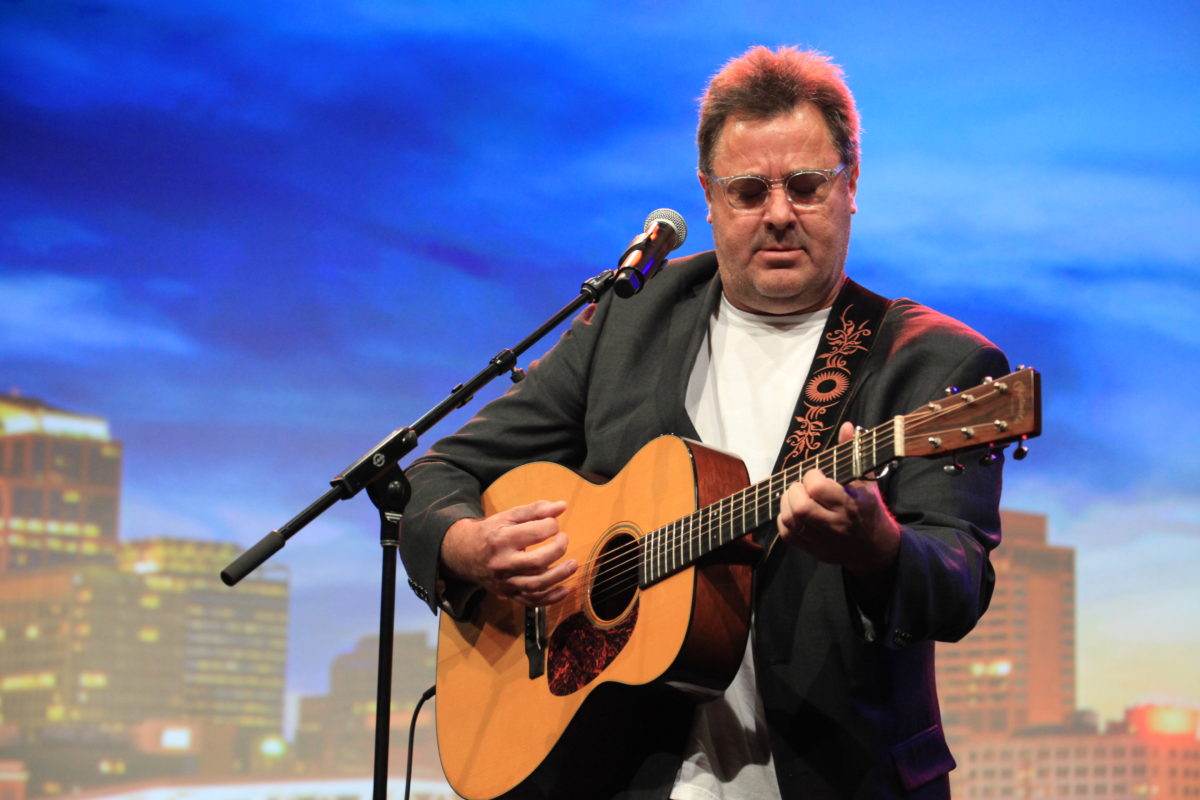
Vince Gill Performs at the 2016 American Eagle Awards
Musical artists have come from all over the world for a chance to perform on the stage that is the Grand Ole Opry. Starting as the WSM Barn Dance in the fall of 1925, the show has enchanted artists and fans alike ever since. Legends such as Hank Williams and Patsy Cline have dazzled with their talents there, as have modern-day hit-makers like Carrie Underwood and Brad Paisley. It’s been called the “home of American music” and “country’s most famous stage.” Every year, hundreds of thousands of people make pilgrimages across town or around the world to the Grand Ole Opry to see the show live. Millions more tune in to Opry broadcasts via a mobile app, SiriusXM Satellite Radio, Nashville’s 650 AM WSM, and on opry.com and wsmonline.com.
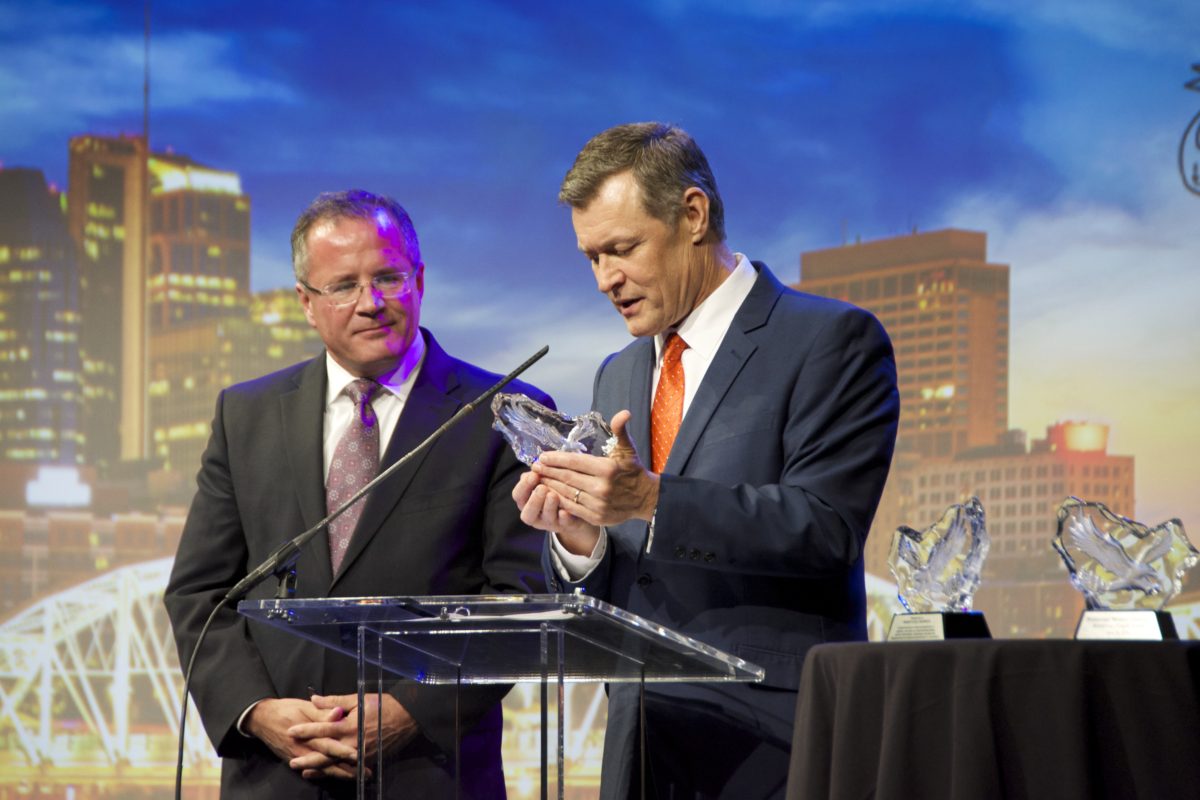
WSM’s Bill Cody Presents the Award to Opry GM Pete Fisher
The Council also presented its annual Leadership in Music symposium prior to the awards. The event included a conversation with the honorees hosted by NMC board member Charlie Sanders who was joined by SGA President Rick Carnes. Also featured at the symposium was the Emmy Award winning animation created by the NMC and MPA as part of a primary school lesson plan that encourages kids to think about the ramifications of taking other people’s creative works without permission. NMC Director David Sanders frames the animated piece as “part of a world-wide effort by creators to change the narrative in terms of fostering an understanding that the online protection of creative works enhances freedom of speech and the marketplace of ideas, rather than encroaching on them.”
The National Music Council continues to serve as a forum for the free discussion of this country’s national music affairs and challenges. Founded in 1940 to act as a clearinghouse for the joint opinion and decision of its members and to work to strengthen the importance of music in our life and culture, the Council’s initial membership of 13 has grown to almost 50 national music organizations, encompassing every important form of professional and commercial musical activity.
Through the cooperative work of its member organizations, the National Music Council promotes and supports music and music education as an integral part of the curricula in the schools of our nation, and in the lives of its citizens. The Council provides for the exchange of information and coordination of efforts among its member organizations and speaks with one voice for the music community whenever an authoritative expression of opinion is desirable.
Past American Eagle Award recipients include Kris Kristofferson, Quincy Jones, Herbie Hancock, Clive Davis, Van Cliburn, Benny Goodman, Lionel Hampton, Dizzy Gillespie, Morton Gould, Dave Brubeck, Marian Anderson, Lena Horne, Roy Clark, Roberta Peters, Odetta, Sherman Halsey, Stephen Sondheim, Sesame Street, Hard Rock Cafe, Music Makes Us, and VH-1 Save the Music Foundation. This year’s event in Nashville marks the 33rd year of formal presentations of the Awards.
To coincide with the House Appropriations Committee markup of the FY2017 Labor-HHS-Education bill markup, NAfME and the Music Education Roundtable has begun its grassroots advocacy push for Title IV, Part A funding. We urge you to contact your members of Congress and ask them to support music education by fully funding Title IV, Part A. Please take action by sending your Representatives and Senators a short letter via the NAfME Grassroots Action Center at bit.ly/NAfMEgrassroots. Please share this action link with, colleagues, peers, and other supporters of music education. The action alert will stay active well into September.
Thank you for your continued support. Our collective advocacy helped us reach this point through the passage of ESSA; let us now make sure its programs are appropriately funded to make music education a priority!
2016 Federal Appropriations Requests
Who We Are:
The National Association for Music Education (NAfME) is among the world’s largest arts education organizations, representing more than 60,000 music educators across the nation. Advocating at the federal, state, and local levels, the Association orchestrates success for millions of students nationwide and has supported music educators at all teaching levels, grades PreK-16, for more than a century.
The Music Education Policy Roundtable (MEPR) is a coalition spearheaded by the National Association for Music Education (NAfME), consisting of organizations such as the National Music Council who advocate for and support music education access for all children. MEPR believes that music education should be taught by certified music educators, delivering sequential, standards-based music education to all students across the nation, regardless of personal circumstance or background.

Overview of 2016 Requests:
With the recent passage and signing of the Every Student Succeeds Act (ESSA), NAfME and MEPR would like to take this time to thank Congress for passing this historic piece of legislation. The legislation’s enumeration of “music” as part of a “Well-Rounded Education” marks an unprecedented step forward for music education. As ESSA implementation gets under way, the most important request that our organizations can make is for Congress to fully fund this legislation. As such, the Roundtable has developed several specific appropriations requests, which we offer for consideration, as funding proposals begin to take shape in the U.S. Senate and House of Representatives regarding the programs authorized within ESSA.
Roundtable Federal Legislative Recommendations:
APPROPRIATE FUNDING FOR ALL ‘WELL-ROUNDED’ PROGRAMS: The inclusion of “music” within the definition of a “Well-Rounded Education” in ESSA provides a significant number of opportunities for supporting access to music education at the state and local levels. The specific enumeration of music in statute further articulates music’s eligibility for Title I, Title II, and Title IV funding. In order to realize the vision of maximizing these new federal resources in support of music education, Congress must do all that it can to prioritize ESSA funding during the upcoming appropriations process. As such, we ask that Congress:
- Support Access to Music Education for the Most Disadvantaged Students by Fully Funding Title I, Part A: Title I, Part A programs, both school-wide and targeted, are now available to provide supplemental funds for a well-rounded education, including music.
| Funding History for Title I to LEAs (in millions) | |||
| FY 2015 | FY 2016 | FY 2017 | President’s Request FY 2017 NAfME Roundtable Request |
| $14,409.80 | $14,909.00 | $15,359.80 | $15,359.80 (Authorized Level) |
Under the new ESSA, the School Improvement Grants (SIG) were eliminated and states are now required to reserve 7 percent of Title I, Part A funds to support school improvement in the place of this elimination. In order to ensure school districts do not see a decrease in Title I, Part A allocations due to this reservation, we ask Congress to fully fund for Title I, Part A at its authorized $15.36 billion level, which is the combined total Title I, Part A and SIG program funding in FY16.
- Support Professional Development for Music Educators by Fully Funding Title I, Part A, Title II, Part A and Title IV, Part A and F: These funds may be used to support professional development for music educators, as part of supporting a “Well-rounded Education.”
- Supporting Effective Instruction, Title II, Part A (formerly, Teacher Quality Program)
| Funding History (in millions) | |||
| FY 2015 | FY 2016 | FY 2017 | President’s Request FY 2017 NAfME Roundtable Request |
| $2,349.83 | $2,349.83 | $2,250.00 | $2,290.00 (Authorized Level) |
- Assistance for Arts Education (formerly, Arts in Education), Title IV, Part F
| Funding History (in millions) | |||
| FY 2015 | FY 2016 | FY 2017 | President’s Request FY 2017 NAfME Roundtable Request |
| $25.00 | $27.00 | $27.00 | $30.00 |
Our music educators deliver an important role in enabling student success. Appropriate funding levels for these programs provide unique federal support for professional development for our educators and bolster the skills development they need to provide a high-quality music education for our nation’s students, part of Congress’ vision of a “Well-Rounded Education.”
- Support Access to Music Education as Part of a Well-Rounded Education by Fully Funding Title IV, Part A:
Under Title IV, Part A of ESSA, the Student Support and Academic Enrichment Grants (SSAEG) provides a new and clear intent to support our nation’s schools through a “Well-Rounded Education.” As such, this new competitive block-grant may be used in part to improve access to music education, and in turn, to support not only student success, but also the promotion of constructive student engagement, problem solving, and conflict resolution. In addition, other funds may be utilized to offer a broad array of enriched educational experiences, such as providing music to underrepresented, disadvantaged, and minority student populations.
- Student Support and Academic Enrichment Grants (SSAEG), Title IV, Part A
| Funding History (in millions) | ||
| ESSA Authorized Level | FY 2017 | President’s Request FY 2017 NAfME Roundtable Request |
| $1,650.00 | $500.00 | $1,650.00 (Authorized Level) |
Despite being the third largest authorized program within ESSA, the President’s FY17 Budget request only recommends $500 million for the grant, less than one-third of its authorized funding level, which Congress agreed upon in a bipartisan manner. By significantly underfunding this program, it undermines the greater flexibility that Congress had intended for states and districts, and would not allow schools to make meaningful investments in critical areas of need, such as school music programs.
td {vertical-align:top;}
td.bot {vertical-align:bottom !important;font-weight:bold;}
table, td, tr {border:1px solid #eee !important;}
The National Music Council will bring its annual American Eagle Awards presentation to Nashville, Tennessee, for a second year in a row on Saturday, June 25, 2016. The highly prestigious Eagle Awards are presented each year in national celebration of an individual’s or an organization’s long term contribution to America’s musical culture and heritage. This year, music legends Emmylou Harris and Vince Gill will be honored, along with the iconic Grand Ole Opry.
Past American Eagle Award recipients include Kris Kristofferson, Quincy Jones, Herbie Hancock, Clive Davis, Van Cliburn, Benny Goodman, Lionel Hampton, Dizzy Gillespie, Morton Gould, Dave Brubeck, Marian Anderson, Jim Halsey, Lena Horne, Roy Clark, Elliott Carter, The Oak Ridge Boys, Roberta Peters, Odetta, Sherman Halsey, Stephen Sondheim, Sesame Street, Hard Rock Cafe, Music Makes Us, and VH-1 Save the Music Foundation. This year’s event in Nashville will mark the 33rd year of formal presentations of the Awards.
Emmylou Harris is one of the most admired and respected female vocalists in music history. With 13 Grammy Awards and a trio of CMA trophies, her work has garnered admiration and praise from her peers. Beginning with her 1975 masterpiece Pieces Of The Sky, Harris began to carve out a reputation as one of the genre’s most progressive talents – though one with a clear reverence toward the history of the Country format. She made songs by The Louvin Brothers, Buck Owens, and Hank Snow hits again. She also teamed up with Dolly Parton and Linda Ronstadt for the iconic Trio album in 1987. Harris was inducted as a member of the Grand Ole Opry in 1992, and into the Country Music Hall of Fame in 2008.
Whether it be Country, Rock, Bluegrass, or Gospel, there is no genre of music that Vince Gill hasn’t excelled in during his much-heralded career. Starting out playing in a Bluegrass band called Mountain Smoke when he was a teenager, he later joined Boone Creek – a band fronted by future Country star Ricky Skaggs. He spent three years as lead singer of the Pop / Rock group Pure Prairie League before moving to Nashville in the early 1980s. It took him a few years to find his artistic path, but he hit big in 1990 with “When I Call Your Name.” Future hits included “Liza Jane” and “Go Rest High On That Mountain.” Twenty Grammy Awards later, Gill stands as one of the most revered male artists of all time. He was inducted into the Grand Ole Opry in 1991, and the Country Music Hall of Fame in 2007.

Emmylou Harris
Musical artists have come from all over the world for a chance to perform on the stage that is the Grand Ole Opry. Starting as the WSM Barn Dance in the fall of 1925, the show has enchanted artists and fans alike ever since. Legends such as Hank Williams and Patsy Cline have dazzled with their talents there, as have modern-day hit-makers like Carrie Underwood and Brad Paisley. It’s been called the “home of American music” and “country’s most famous stage.” Every year, hundreds of thousands of people make pilgrimages across town or around the world to the Grand Ole Opry to see the show live. Millions more tune in to Opry broadcasts via a mobile app, SiriusXM Satellite Radio, Nashville’s 650 AM WSM, and on opry.com and wsmonline.com.
The event will also feature the New York Emmy award winning animation created by the NMC and the Music Publishers Association of the United States, as part of a primary school lesson plan that encourages kids to think about the ramifications of taking other people’s creative works without permission. NMC Director David Sanders frames the animated piece as “part of a world-wide effort by creators to change the narrative in terms of fostering an understanding that the online protection of creative works enhances freedom of speech and the marketplace of ideas, rather than encroaching on them.”
The National Music Council continues to serve as a forum for the free discussion of this country’s national music affairs and challenges. Founded in 1940 to act as a clearinghouse for the joint opinion and decision of its members and to work to strengthen the importance of music in our life and culture, the Council’s initial membership of 13 has grown to almost 50 national music organizations, encompassing every important form of professional and commercial musical activity.
Through the cooperative work of its member organizations, the National Music Council promotes and supports music and music education as an integral part of the curricula in the schools of our nation, and in the lives of its citizens. The Council provides for the exchange of information and coordination of efforts among its member organizations and speaks with one voice for the music community whenever an authoritative expression of opinion is desirable. Proceeds from the event support the Council’s music education advocacy efforts.
The awards will be presented at a 1:00 pm ceremony in the Davidson Ballroom of the Nashville Music City Center as part of the Summer NAMM Show. A VIP luncheon and interview/reception with the honorees will accompany the awards presentation. For tickets, schedule, and sponsorship information, visit musiccouncil.org, or contact NMC Director David Sanders at sandersd@mail.montclair.edu
After years of negotiating and lobbying, the AFM, in partnership with the airline carry-on coalition, marked the implementation of a final rule from the Department of Transportation regarding musical instruments as carry-on and checked baggage. The new rule was the result of legislative language included in Section 403 of the FAA Modernization and Reform Act of 2012. As of March 6, 2015, musicians are allowed to bring certain musical instruments in-cabin on US carriers. The rule clearly outlines carry-on and checked baggage procedures.
The AFM has developed two manuals to help musicians navigate the process: A Guide to Traveling with Musical Instruments can be found on AFM.org by logging into “myAFM,” then clicking the “Document Library” tab, and opening the “Legislative Office” folder. This desktop copy was designed to help musicians members understand domestic carry-on requirements and regulations for traveling internationally with instruments that contain CITES related materials. In addition, a pocket-sized handbook, developed in cooperation with the Carry-on Coalition, can be downloaded at: AFM.org/departments/
The 2016 American Eagle Awards will be held at Summer NAMM in Nashville, TN. Please save the date for the 33rd Annual Awards Luncheon and Leadership in Music Symposium. Honorees to be announced.
The National Music Council and the Music Publishers Association are looking for students to creatively present their viewpoints, in video format, on “The Importance of Intellectual Property and Copyright Law”. Complete rules and guidelines available at www.mpa.org.
Here are some questions you might want to think about when making your submission:
Who does copyright protect? Why is it important to protect intellectual property? What would the world be like if there were no protections for intellectual property? Why do you think people ignore copyright laws? What can other students learn from watching your video?
You can submit online by using the following form:
http://www.mpa.org/content/2016-scholarship-application
You can see previous winners on our YouTube channel here: http://www.mpa.org/content/mpa-nmc-announce-2015-scholarship-winners
Read the rules below: Questions regarding the scholarship can be directed to scholarship@mpa.org.
OFFICIAL RULES OF THE NMC COPYRIGHT AWARENESS SCHOLARSHIP PROGRAM SPONSORED BY THE MPA
1. ELIGIBILITY: The NMC Copyright Awareness Scholarship Program Sponsored by the MPA for 2016 is open only to those legal residents of the fifty (50) United States and the District of Columbia and individuals currently studying in one of the fifty (50) United States and the District of Columbia pursuant to a valid F-1 Student Visa who are between thirteen (13) and twenty-five (25) years of age at the time of application and who are currently enrolled in an accredited secondary school or post-secondary institution of higher learning (college, university or trade school). Students must supply contact of school official so that enrollment can be confirmed.
Current employees, officers, directors and agents of Sponsor and their immediate family members (defined as spouse, parents, siblings and children) are not eligible to win.
2. HOW TO ENTER: To enter, beginning February 1, 2016 go to www.mpa.org and follow the instructions for completing the Application and uploading your Submission.
Applications must be submitted by Sunday, May 29 no later than 11:59 PM EST. No exceptions will be made to submit past this deadline.
Limit one (1) Application and Submission per person. Written, pictorial, audio or video responses that are obscene, pornographic, defamatory or otherwise objectionable will be disqualified. All Applications and Submissions become the property of the Sponsor and will not be returned. Sponsor assumes no responsibility for lost, late, misdirected, or unintelligible entries. By submitting an Application and Submission, you fully and unconditionally accept and agree to these Official Rules and the decisions of the Sponsor, which are final and binding.
The NMC and MPA are looking for students to creatively present their viewpoints, in VIDEO format, on The Importance of Intellectual Property and Copyright Law. All submissions must consist primarily of original material. If a submission contains copyrighted material (e.g., a song, a video clip) owned by another party, please submit evidence of permission to use that material. Submissions that contain copyrighted material but which do not include such evidence of permission to use that material will be automatically disqualified.
*Videos must be in .mp4, .m4v, mov, or .wmv formats. Other formats will not be accepted.
*Files must be 8MB or less.
*Videos should be between thirty (30) seconds and three (3) minutes.
*Winners must be able to supply a high quality version of their video.
*Files uploaded must contain the name of the student. Examples: jennifer_smith.m4v, john_harris.mov, jim_ellis_pirate_party.wmv. If files are not named appropriately they will not be viewed.
3. SELECTION OF POTENTIAL WINNERS: Sponsor is looking for Submissions that are well-constructed and clearly and creatively address the topic. On or about June 16, 2016, a qualified panel of judges will select three (3) potential winners. Winner we be notified by the end of August, 2016.
4. PUBLICITY: By submitting an Application and Submission, Applicant (or, if a minor, his/her parent or legal guardian) agrees that Sponsor may, without any limitation or further compensation or notice, use his or her name, voice and/or likeness in any and all media, worldwide, for the purpose of advertising and promoting the Website, the Sponsor, the Scholarship Program, or any other promotion, contest or sweepstakes of the Sponsor.
5. OWNERSHIP: By submitting an Application and Submission, Applicant (or, if a minor, his/her parent or legal guardian) grants to Sponsor a worldwide perpetual non-exclusive license to use, reproduce, distribute and exploit the material submitted, including the worldwide copyright and any extensions, renewals, revivals, reversions and restorations thereof, for any educational, promotional or other non-commercial purpose. Applicant further agrees that Sponsor and its designees may edit and modify the Submission and all elements of it in any and all media now known or not currently known, throughout the world in perpetuity without compensation, permission or notification to Applicant or any third party. Notwithstanding the foregoing, Applicant shall be entitled to terminate the license granted to Sponsor hereunder upon written notice to Sponsor after a period of five (5) years from the date Applicant submits the Application and Submission.
6. REPRESENTATIONS AND WARRANTIES/INDEMNIFICATION: Each person who enters this Scholarship Program represents and warrants to Sponsor as follows: (i) the Application and Submission, including any written, pictorial, audio and/or video content are the Applicant’s own original, previously unpublished, and previously unproduced work (except for any copyrighted material owned by third parties as to which all necessary permission to use such material has been obtained) and, as of the date of submission, are not the subject of any actual or threatened litigation or claim; (ii) the Application and Submission, including any written, pictorial, audio and/or video content, neither infringes upon nor violates the intellectual property rights or other rights of any other person or entity; (iii) the Application and Submission, including any written, pictorial, audio, and/or video content, does not and will not violate any applicable laws, and meets the Official Rules set forth herein. Each Applicant hereby agrees to indemnify and hold the Sponsor harmless from and against any and all third party claims, actions or proceedings of any kind and from any and all damages, liabilities, costs and expenses relating to or arising out of any breach or alleged breach of any of the warranties, representations or agreements of Applicant hereunder.
7. NO OBLIGATION TO USE: Sponsor shall have no obligation (express or implied) to use any winning Submission, or to otherwise exploit a winning Submission or continue the development, production, distribution or exploitation thereof, and Sponsor may at any time abandon the use of the winning Submission for any reason, with or without legal justification or excuse, and the Scholarship prize recipients shall not be entitled to any damages or other relief by reason thereof.
8. LIST OF SCHOLARSHIP PRIZE RECIPIENTS: The names of the Scholarship prize recipients and their winning Submissions may be posted on Sponsor’s Websites.
9. SPONSOR: The NMC Copyright Awareness Scholarship is sponsored by The Music Publishers Association of the United States and the National Music Council (NMC).
.attachment-thumbnail {display:none;}
h2 {display:none;}
